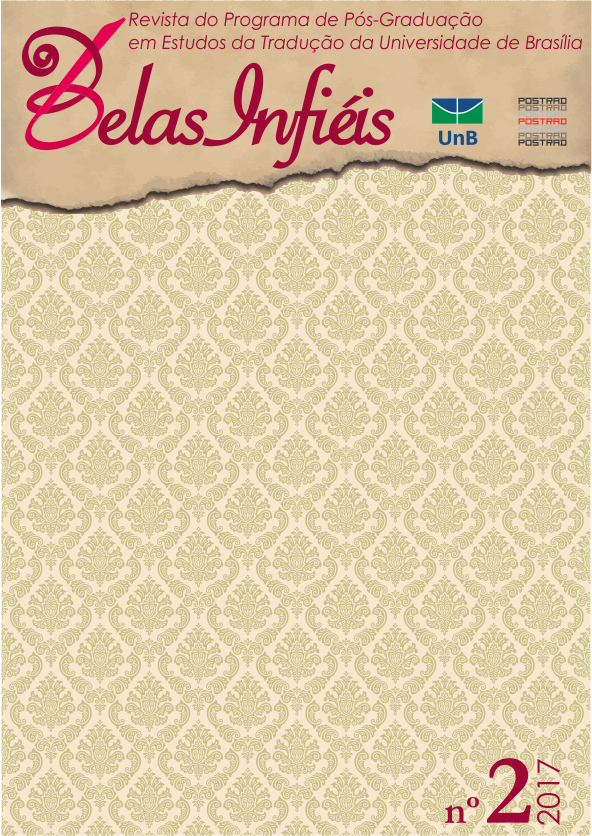OS ESCRITORES E A TRADUÇÃO NA EDITORA GLOBO ENTRE AS DÉCADAS DE 1930 E 1960
DOI:
https://doi.org/10.26512/belasinfieis.v6.n2.2017.11457Palabras clave:
Editora Globo, Escritor-tradutor, Cânone literário, Tradução literáriaResumen
É inegável a importância da editora Globo de Porto Alegre na consolidação de uma literatura estrangeira de qualidade no Brasil. Por seu intermédio, leitores brasileiros puderam conhecer, em impecáveis traduções, obras de Thomas Mann, Somerset Maughan, Virginia Woolf, Marcel Proust, Giovanni Papini, Conrad, Graham Greene, Aldous Huxley, John Steinbeck, autores das mais diversas nacionalidades. Para fazê-lo, os editores Bertaso e Verissimo, responsáveis pela seleção das obras que seriam traduzidas pela Globo, bem como pela escolha do tradutor incumbido para tal função, faziam questão de manter um seleto e experiente grupo de escritores-tradutores, que contou com nomes tais como Mario Quintana, um dos tradutores mais produtivos da Casa, Manuel Bandeira, Carlos Drummond de Andrade, Cecília Meireles, José Lins do Rego, além do próprio Erico Verissimo. Tendo em vista tais fatos, pretende-se, com esse trabalho, investigar o quadro de tradutores da Coleção Nobel, única coleção da editora Globo dedicada exclusivamente à literatura traduzida, atentando para a escolha dos tradutores de acordo com o valor literário atribuído à obra a ser traduzida, a fim de refletir acerca da influência do escritor-tradutor na formação do cânone de literatura traduzida no Brasil.
Descargas
Citas
AMORIM, Sônia Maria de. Em Busca de um Tempo Perdido: edição de literatura traduzida pela Editora Globo (1930-1950). São Paulo: Edusp; Porto Alegre: Editora da Universidade, 2000.
BERTASO, José Otávio. A Globo da rua da praia. São Paulo: Globo, 1993.
BLOOM, Harold. O cânone ocidental. Tradução, introdução e notas de Manuel Frias Martins. Lisboa: Temas e debates ”“ Círculo de Leitores, 2013.
BONNICI, Thomas; FLORY, Alexandre Villibor; PRADO, Marcio Roberto (Org.). Margens instáveis: tensões entre teoria, crítica e história da literatura. Maringá: Eduem, 2011.
COMPAGNON, Antoine. Le démon de la théorie : littérature et sens commun. Paris: Editions du Seuil, 1998.
CUNHA, Patricia Lessa Flores da. "De Souza Júnior: um risco claro na vida da província". In: BAKOS; Margaret Marchiori; PIRES, Leticia de Andrade (Orgs.). Os escritores que dirigiram a Biblioteca Pública do Estado do Rio Grande do Sul. Porto Alegre: EDIPUCRS, 1999.
HALLEWELL, Laurence. O livro no Brasil: sua história. Tradução de Maria da Penha Villalobos; Lólio Lourenço de Oliveira. São Paulo: Queiroz Editor, 1985.
JULLIEN, Dominique. “The way by Lydia's (I): réflexions sur la traduction de Lydia Davis”. In: SOSTERO, Geneviève Henrot; LAUTEL-RIBSTEIN, Florence (Orgs.). Revue d'études proustiennes : traduire “A la Recherche du temps perdu”. Paris: Classiques Garnier, 2015. pp. 69-82.
PAES, José Paulo. Tradução: a ponte necessária. Aspectos e problemas da arte de traduzir. São Paulo: Ática, 2008.
TORRESINI, Elisabeth Rochadel. Editora Globo: uma aventura editorial nos anos 30 e 40. São Paulo: Edusp; Porto Alegre: Editora da Universidade, 1999.
VERISSIMO, Erico. Um certo Henrique Bertaso: artigos diversos. São Paulo: Globo, 1996.
VERISSIMO, Erico. Solo de clarineta: memórias, primeiro volume. Porto Alegre: Globo, 1974.
WYLER, Lia. Línguas, poetas e bacharéis: uma crônica da tradução no Brasil. Rio de Janeiro, Rocco, 2003.
Descargas
Publicado
Cómo citar
Número
Sección
Licencia
Copyright Statement
Given the public access to this journal, the texts are free to use but requires the recognition of the original authorship and initial publication in this journal to be properly stated.
The journal allows the use of works published for non-commercial purposes, including the right to submit the work to publicly accessible databases. Published contributions are the sole and exclusive responsibility of the author(s).
- When submitting papers to be evaluated by the Belas Infiéis journal, the author(s):
- Declare that the contents of the contributions are original and of their original creation, being entirely responsible for their content if there is an objection by third parties.
- Claim to be aware that they should not commit academic plagiarism.
- Declare that the manuscript has not been published, completely or partially, in Portuguese or another language. If it is a translation it should be submitted to the Translated Articles section.
- Declare that the manuscript is not being evaluated by other journals.
- Declare that the manuscript was not submitted to another journal simultaneously.
- Commit(s) to inform the journal of any kind of error or inaccuracy in their contribution (published, in evaluation or in editing) and to collaborate with the editors to make due corrections of the article (when in evaluation or editing) or erratum/retraction (after publication).
- Declare that there is no conflict of interest regarding the published work.
- Authorize its release if it is accepted for publication without any kind of monetary compensation.
- Agree to assign non-exclusive rights to publication to the magazine, remaining free to make their contribution available in other media as long as the publication of the first version in Belas Infiéis magazine is mentioned. They also authorize Belas Infiéis to assign their texts for reproduction in content indexers, virtual libraries and similar platforms.
- Maintain copyright and grant the journal the right of first publication, the work being licensed under theCreative Commons Attribution License.
- Is/Are allowed and encouraged to publish and distribute their work online after the editorial process, which may increase the impact and citation of the published work.
- Authorize the editorial team to make textual adjustments and to adapt the article to the publication rules, when necessary.



















